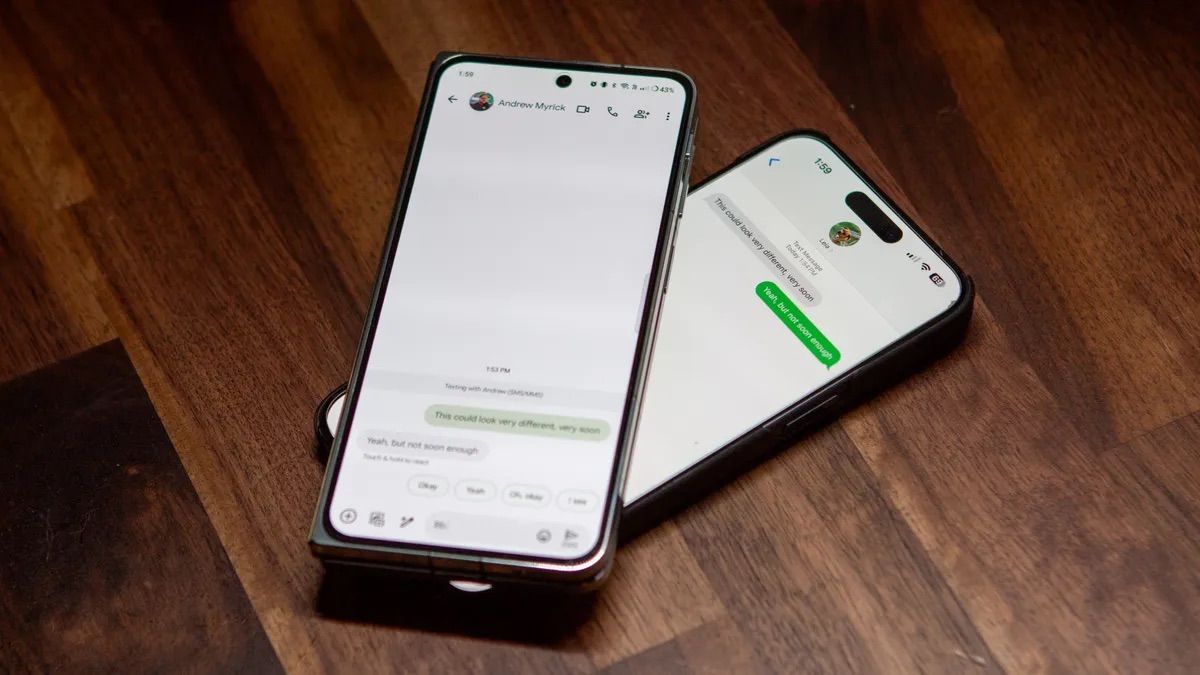The ongoing rivalry between tech titans Apple and Google, particularly regarding Rich Communication Services (RCS) messaging, has provided a fascinating spectacle for industry watchers. RCS represents a modern alternative to traditional SMS and MMS, boasting enhanced security, versatility, and an array of advanced features that far exceed those earlier messaging protocols. Yet, when users of iPhones communicate, they typically rely on iMessage, Apple’s proprietary messaging application, rather than the standard SMS or MMS methods. This dynamic explains why Google notably invested in advertising campaigns aimed at pressuring Apple to integrate RCS into the iPhone, thereby enriching the messaging experience for users transitioning between iOS and Android platforms.
With the rollout of iOS 18, Apple has finally embraced RCS support for its iPhone line, leading many to speculate if Google’s efforts have paid off. However, the reality is far more complex — Apple’s introduction of RCS appears to be less about fulfilling Google’s wishes and more about preempting regulatory scrutiny. Interestingly, Google recently published a blog post that highlights “the top four updates we’ve made to make the switch even easier,” proclaiming Apple’s adoption of RCS as a significant development in facilitating user transitions between iOS and Android.
Apple’s support for RCS is certainly making it simpler for users to migrate from iOS to Android, benefiting those who prefer the enhanced messaging capabilities that RCS provides. However, as has been previously noted, there’s a strong likelihood that Apple’s decision to implement RCS stems more from regulatory considerations than a desire to cater to Google’s agenda. Notably, around the time of Apple’s RCS announcement, the European Union reconsidered its designation of iMessage as a core platform service, indicating that external pressures played a key role in Apple’s strategy. Moreover, Apple’s compliance with requirements for RCS support in 5G-enabled devices sold in China reflects a broader business imperative beyond appeasing its rivals.
No matter how much Google believes it played a pivotal role in Apple’s decision to incorporate RCS, the reality is clear: it had no hand in shaping Apple’s messaging strategy. While I appreciate Google’s enthusiasm for RCS, I still question whether its significance in the larger context of the ongoing iOS versus Android competition is as substantial as Google asserts.
Google is right (and wrong) about RCS on iPhone — and how it affects Android
(Image credit: Andrew Myrick / Android Central)
Shortly before the public release of iOS 18, I inserted my main SIM into the Google Pixel 9 Pro Fold and immediately noticed a transformation in my conversations with tech-savvy friends, many of which switched to RCS. This upgrade facilitated the sharing of high-resolution photos and videos, enabled customary read receipts and message reactions, and greatly enhanced group chat functionality. Unsurprisingly, the bulk of my previous frustrations encountered while messaging with iPhone users via SMS and MMS were resolved in this transition.
While I dispute Google’s assertion of ownership over the implementation of RCS on iPhones, I concur with the central claim that RCS significantly enriches the cross-platform texting experience, a reality I have experienced personally. However, its wider impact on user behavior and the market heavily depends on the willingness of iOS users to adopt this technology. The first obstacle is the need for users to upgrade to iOS 18. Next, they must remember to keep the RCS toggle enabled rather than turning it off out of spite for their Android-using friends. Additionally, specific carriers do not support RCS on iOS, complicating the landscape further.
The necessity of iOS upgrades is my primary concern here. Historically, iOS upgrades have enjoyed rates of adoption that surpass those of Android devices, though this trend has begun to plateau in recent times. Anecdotally, it appears that the vast majority of my family and friends, who do not work in technology, have yet to make the leap to iOS 18. This suggests that I may need to forcibly upgrade their devices if I ever expect to share RCS-enabled messages with them.
Receive the hottest deals and product recommendations alongside the biggest tech news from the Android Central team straight to your inbox!
The scant data available regarding iOS 18 adoption rates implies that my situation might not be an isolated case. As per data from Statcounter, as of October 2024, less than 20% of iPhones are reportedly running iOS 18. If this figure is accurate, it signifies that only a maximum of one-fifth of iPhone users currently have access to RCS. In stark contrast, over half of iPhone users are still operating on varying iterations of iOS 17 as of last month.
In a recent discussion with CNBC, Apple CEO Tim Cook noted that “users are adopting iOS 18.1 at twice the rate that they adopted 17.1 in the year-ago quarter.” However, this statement lacks specificity, leaving us uncertain if Cook’s words pertain solely to those upgrading from iOS 18 to 18.1 or if they include users jumping from older versions directly to iOS 18.1.
The crux of the matter is that not every iPhone is currently compatible with RCS. In all likelihood, a minimal percentage of iPhones are running iOS 18, indicating that RCS utilization is probably quite limited. This sluggish adoption suggests that RCS is far from becoming a mainstream feature on iOS, which means its potential influence on the ongoing competition between iPhone and Android will remain negligible.
All the other reasons Google thinks you should try Android (and what we think you should switch to)
(Image credit: Apoorva Bhardwaj / Android Central)
Putting aside Google’s questionable claims regarding RCS support on the iPhone, the company does present several compelling arguments highlighting the ease of switching between platforms. With the launch of Android Switch, users can now transfer an extensive array of data, from conversations and contacts to Wi-Fi logins, when moving to a new Android device. Furthermore, Google emphasizes that transferring data between iOS and Android via a cable has become 40% faster, significantly streamlining the process.
Additionally, Google highlights that users can experiment with the Google Pixel 9 without the immediate necessity to transfer data, with the option to do so at a later time if they find the device appealing. The feature of express setup simplifies the transition from one Android handset to another, enhancing the overall experience.
While it’s clear that RCS did not suddenly simplify the shift to Android, nor is Google responsible for Apple’s addition of this feature to models like the iPhone 16 Pro Max, the landscape is certainly more accommodating than it has been in the past, particularly with Android hardware reaching impressive levels of quality. Many attractive devices from brands like Google, Samsung, and OnePlus are now available to entice iPhone users to make the switch out of the Apple ecosystem.
As someone who has extensively used both iOS and Android, I can confidently endorse the Google Pixel 9 Pro XL as the device that offers the most similar experience to an iPhone. Its polished design and outstanding software features exemplify the advancements in Android technology — in certain cases, Google’s AI capabilities even outshine those of Apple’s. My initial migration from iPhone nearly five years ago was inspired by a desire to explore foldable devices, with the Samsung Galaxy Z Fold 6 standing out as an incredible option for others seeking the same experience.
Both OnePlus and Samsung are gearing up for the launch of new flagship models in the U.S., making it wise to potentially delay purchasing devices like the OnePlus 12 or Galaxy S24 series for now. However, with Black Friday and Cyber Monday on the horizon, it’s essential to keep an eye out for attractive deals on these sought-after models. In fact, we’ve already curated a list of some of the best phones to consider upgrading to this upcoming Black Friday.
In conclusion, this is an excellent time to consider making the switch to Android. The platform is evolving positively, and transitions between iOS and Android are becoming increasingly manageable. Nevertheless, Google must let the RCS narrative drop. Its fixation on Apple and RCS tends to repel iPhone users and detracts from its overall message.
What are the potential impacts of RCS messaging on the rivalry between Apple and Google?
**Interview with Tech Analyst Jessica Mnuchin on the Apple-Google Rivalry and RCS Implementation**
**Interviewer:** Welcome, Jessica! It’s always a pleasure to have you on the show. Today, we’re delving into the ongoing rivalry between Apple and Google, particularly with the recent introduction of RCS messaging on iPhones. What are your initial thoughts on this development?
**Jessica Mnuchin:** Thanks for having me! The introduction of RCS on iPhones is a significant move, but it’s crucial to understand the context. While Google has campaigned for this integration, I believe Apple’s decision is more influenced by regulatory pressures rather than a direct response to Google’s wishes.
**Interviewer:** That’s an interesting perspective. Some argue that Google’s relentless push for RCS adoption has finally paid off. Do you see it that way?
**Jessica Mnuchin:** Partially. Google’s advocacy for RCS has indeed raised awareness and made a compelling case for richer messaging experiences. However, the underlying motive for Apple may not just be about enhancing user experience. With the EU scrutinizing messaging platforms, implementing RCS could be viewed as a strategy to preempt regulatory scrutiny rather than a genuine effort to cater to Android users.
**Interviewer:** You mentioned regulatory influences. How do you think this impacts user behaviour and the overall Android versus iOS competition?
**Jessica Mnuchin:** The impact largely depends on user adoption rates of iOS 18. Historical trends suggest that iOS upgrades tend to be swift, but they do plateau. As we see, around 20% of iPhones are on iOS 18 as of now, which means RCS is accessible to a limited audience. The broader adoption will be slow, which mitigates RCS’s potential as a game-changer for cross-platform communication.
**Interviewer:** That makes sense. Google also announced data transfer features to ease the switch to Android devices. Do you think this will attract more users from iOS?
**Jessica Mnuchin:** Absolutely. Google’s updates, such as the faster data transfer process and the ability to try out the Pixel 9 without immediate data transfer, provide a fork-in-the-road for potential switchers. These improvements can significantly reduce the friction typically associated with switching platforms, leading to a smoother user experience.
**Interviewer:** With all these changes, do you think RCS will eventually become a standard feature that users expect, similar to how iMessage functions on iOS?
**Jessica Mnuchin:** RCS has the potential to become a standard, especially if adoption by iOS users increases. However, we need to consider that a significant factor is how willingly iPhone users will enable this feature. There’s also the issue of carrier support, which varies. Until RCS gains mainstream traction on iOS, it will remain one of many features rather than the defining aspect of messaging between platforms.
**Interviewer:** Very insightful! As a closing thought, how do you foresee the Apple-Google rivalry evolving in the near future?
**Jessica Mnuchin:** The rivalry will remain intense, particularly as both companies continually innovate and respond to market demands. Expect more aggressive marketing as each tries to lure users into their ecosystems. Google’s push for RCS and seamless data migration will be pivotal, while Apple will focus on enhancing the iOS experience while navigating regulatory pressures. It’ll be fascinating to watch how this plays out!
**Interviewer:** Thank you, Jessica, for sharing your insights today. It’s always enlightening to hear your take on these developments.
**Jessica Mnuchin:** Thank you for having me! It’s always a pleasure to discuss the evolving landscape of technology.




